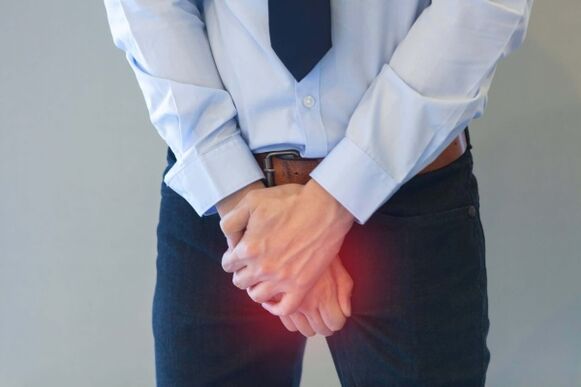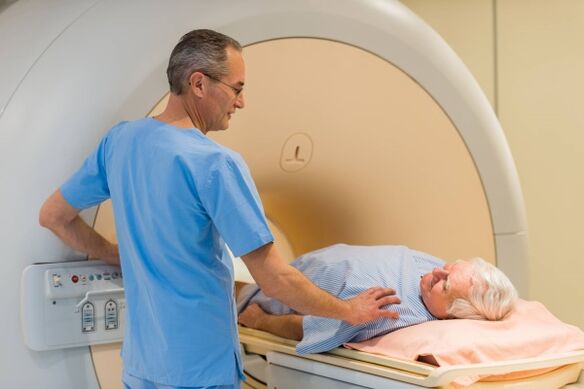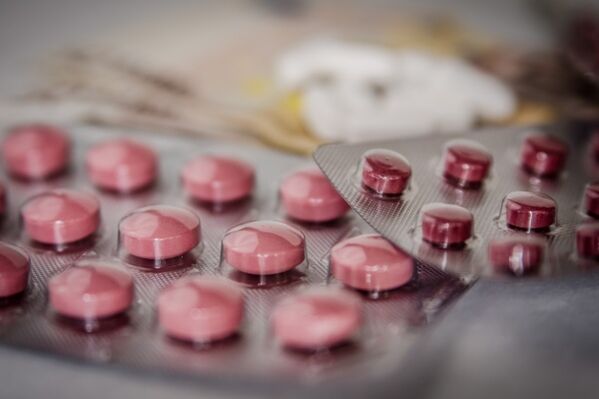Acute prostatitis is characterized by a clear clinical picture. The pathology is dangerous with a number of serious complications, so it needs timely and comprehensive treatment. This article describes how to recognize and treat a disease.
Acute prostatitis is an inflammatory disease that is accompanied by overt painful sensations and can pose a great threat to health. For a successful prognosis, you need to see a doctor in time and prescribe the right treatment.
General features of the disease
Acute prostatitis is a rapidly developing inflammatory process in the prostate gland. It has four stages of development:
- Catarrhal.At this stage, the gland swells slightly, the inflammation affects only the mucous membranes of the glandular secretory ducts. This period is the best time for treatment - if you start now, you can get rid of the disease in less than two weeks. The nature of the inflammation is not purulent, but the resulting edema clogs the ducts and prevents the secretion from the gland. The recession begins.
- Follicular.As a result of stagnation, the bacteria that enter the body already begin to function. Because the organ is made up of cells grouped into lobules and separated by connective tissue, inflammation first affects a part.
- Parenchymal.Inflammation passes from one lobe to another, there are many pustules in different parts of the gland.
- Purulent abscess.The pustules coalesce to form a bladder filled with pus. It may explode over time, spread pus, and enter the cavity around the prostate and bladder, urethra, or rectum. When an abscess is opened, the pus does not come out completely, and this becomes a new stage in the inflammatory process.
How quickly the pathological process develops and how it ends depends on many factors: the causes of inflammation, the timeliness and appropriateness of treatment.
Reasons
In 90% of cases, the cause of acute inflammation of the prostate is an infectious lesion. The causative agents of the disease can be one or more types of bacteria and viruses:
- Gonococci are one of the most dangerous bacteria, rapidly initiating purulent processes.
- Trichomonas is a leader among sexually transmitted microorganisms. The pancreas penetrates the intercellular space, so long-term treatment is required.
- Chlamydia - in addition to toxicity, it can bind erythrocytes, increase the rate of deposition and impede blood circulation in the affected area. They penetrate deeper than Trichomonas.
- Staphylococci, especially golden in appearance, are common. It can live in any tissue and organ, causes itching and makes the blood thicker.
- Ureaplasma is a cross between single-celled and viruses. It can enter the prostate through the urinary tract or unprotected intercourse.
- Escherichia coli is a gram-negative bacterium that is a frequent cause of acute inflammation. It enters the body as a result of poor hygiene during cooking.
This is not a complete list of bacteria and viruses that can cause acute inflammation of the prostate gland.
Often the cause is not only in infections that can live for a long time in the body with almost no symptoms. When there are factors that contribute to this, they begin to develop rapidly:
- Permanent or one-time hypothermia. Colds weaken the body's defenses, and it is more difficult for them to contain pathogenic bacteria, especially if hypothermia is associated with daily activities.
- Irregular sex life. Stopping the secretion of the pancreas (an integral part of sperm) helps bacteria to multiply.
- Escape infections. These can be infections caused by unprotected sex or bacteria that cause mild inflammation in the urinary tract. The consequences of purulent sore throat, which is not completely cured in the form of streptococcus, can also cause inflammation. Tooth decay can even cause prostatitis.
- Weakening of immunity. Bacteria will inevitably show up if the body's immune system is deficient due to illness or uncontrolled antibiotic use.
- Failure to follow the rules of personal hygiene.
Symptoms of acute prostatitis
Symptoms depend on the stage of the disease.
During catarrhal prostatitis, there is a slight feeling of discomfort and heaviness in the perineum, and the urge to use the toilet at night increases. Urine is accompanied by burning and pain. The pancreas itself is normal or not critically enlarged, and palpation shows pain. The temperature remains normal or rises slightly. No poisoning, overall well-being.
The follicular period has more manifestations. The pain grows, becomes stable, and sometimes spreads sharply to the penis, sacrum, or rectum. Urinary retention is seen because it is difficult to urinate due to severe pain. Defecation is also accompanied by severe pain.
The temperature rises to 38 degrees and remains at this level. The prostate gland is noticeably enlarged, has a tight consistency, is tense, and touching some places causes severe pain.

Parenchymal prostatitis is very difficult. Appetite disappears, chills appear, general weakness. Frequent urination is replaced by acute urinary retention. Attempts to empty the bladder or bowel due to unbearable pain are almost impossible. It is aggravated by constipation and a full bladder, spreads to the entire perineum, a slight relief can only be in a prone position with compressed legs.
The temperature rises above 39 degrees. Inflammation begins to spread to other organs, mucus is secreted from the rectum. The contour of the prostate gland is indeterminate, enlarged and painful. Palpation may not be possible due to edema.
The formation of an abscess is accompanied by the localization of a sharp pain point - an abscess has formed. Urine, feces, and gas are extremely difficult to pass, accompanied by severe throbbing pain that spreads to the intestines. The temperature is kept above 39. 5 degrees, with vibrations, fever and sometimes a state of hallucinations.
Then comes a sudden relief: the pain disappears, the temperature drops. However, this does not mean that the patient has recovered: the fact is that the abscess has exploded and now urgent procedures are needed to clean the body of pus, because the negative consequences can be very different.
Diagnostics
Diagnosis is based on the assessment of the patient's complaints, analysis of urine, blood and prostate secretions. In addition, they use digital rectal diagnostics, ultrasound and CT.
The severity of urinary disorders is assessed by uroflowmetry.
General urinalysis allows to determine in the earliest stages of the disease, when the characteristic symptoms are still absent. The alkaline acidity index itself indicates the development of inflammation.
Bacteriological examination of urine allows to determine the nature and causes of inflammation. Changes in the color, odor, or consistency of urine are not necessarily evidence of acute prostatitis.
A complete blood count is the basis for studying the disease. Characteristic features of acute prostatitis are low hemoglobin (normal 130 g / l), high levels of urea and creatinine, as well as leukocyte levels and erythrocyte sedimentation rate. Protein should not be normal, but high levels of leukocytes - no more than 5 units.
Specific analysis of PSA allows to identify not only inflammation, but also malignant formation.
PCR research allows you to quickly identify any genital infection that is often the cause of acute prostatitis.
Ultrasound allows you to determine the size, edges, points and the presence of diffuse changes in the prostate gland. If an abscess has formed, this examination can determine its size and location. If possible, the study should be performed transrectally; If pain and swelling do not allow it, the study of the pancreas is carried out on the abdomen.
Sometimes ultrasound is performed to observe changes in the frequency of sound reflected from the body. This allows you to assess the blood supply to the prostate - a vascularization that can be increased or decreased depending on the type and stage of inflammation. It allows to distinguish a cancerous tumor from acute prostatitis.
If the doctor determines that surgery is necessary, he or she will order a CT or MRI scan to examine the details of the inflammatory process.

Treatment of acute prostatitis
Treatment of the disease is always complex, including different medications, procedures and diet. The treatment can last about 2 months.
The main task of the doctor is to eliminate the cause of inflammation, which is the most common infection. Antibiotics are prescribed for this (alone or in combination). The choice of medication depends on many factors:
- sensitivity to the pathogen;
- concomitant diseases of the patient;
- mode of action of the drug.
Self-diagnosis and treatment are not possible: an effective drug is selected on the basis of laboratory tests
Fluoroquinolones and third-generation cephalosporins are most commonly used to combat the causative agents of an acute inflammatory process. The bactericidal effect of antibiotics for the treatment of acute prostatitis is justified.
Depending on the stage and condition of the patient, the dose and dosage form of the drug is chosen: the more the condition is ignored, the higher the dose, and the sooner the drug reaches its destination. Injectable drugs are better than tablets.
It is necessary to normalize the flow of urine and secretions. When urinary retention becomes an acute form, trocar episistomy is prescribed - perforation of the bladder, followed by the introduction of a thin tube.
If such drastic measures are not needed, non-steroidal anti-inflammatory drugs are prescribed to restore normal urination, relieving swelling and pain. The drug is prescribed in the form of tablets, injections or rectal suppositories.
If acute prostatitis develops into an abscess, treatment depends on the stage. The infiltration phase is treated with active therapy with antibiotics and immunostimulants. Obstruction is given with painkillers to help the patient cope with the pain.
If an abscess occurs, treatment is possible only with surgery: the purulent bladder is opened, washed and drained. After the operation, therapy is prescribed to fight germs and intoxication.
Treatment of acute prostatitis is not limited to relieving symptoms. The course of antibiotics should be taken until the end, not until the pain disappears.
It is time for physiotherapy after the seizure is eliminated. Includes UHF and microwave procedures, electrophoresis and prostate massage. The goal is to eliminate swelling (if left) and improve the excretion of glandular secretions to prevent congestion.
It is important to follow your diet during treatment. You should give up the following products:
- alcohol, coffee, fried and salty - helps the appearance of congestion;
- white cabbage, apples, legumes and raw vegetables - cause swelling, resulting in constriction of the pelvic organs, including the prostate;
- sour drinks, offal - irritate the urinary tract.
The diet should include grains, cooked vegetables, dairy products and baked fruits. All this helps the normal functioning of the intestines. It is necessary to follow a drinking regimen by drinking at least 2 liters of fluid (water, fruit drinks, juices) per day. The sooner the urinary tract is flushed, the lower the risk of inflammation.
Vitamin complexes and peptides should be taken to improve tissue regeneration and rapidly restore normal glandular function.

The optimal course of treatment is assessed by the recovery of glandular tissue, the normalization of the chemical parameters of prostate secretion, the absence of pathogens in the analysis and the general well-being of the patient.
Prognosis and complications
The earlier you start treatment, the faster and easier it will be to get rid of acute prostatitis. Complications are each subsequent stage of the disease, the chronic course of the disease, the spread of inflammation to other organs, infertility, sepsis. If the disease has started, it may be necessary to remove the gland itself.
With timely treatment, at the end of the course of treatment all the functions of the body are restored, the ability to work is fully restored.
Prevention
Preventive measures include the absence of unprotected sex (to exclude STIs), careful hygiene and timely treatment of inflammatory processes in the urinary tract. It is necessary to maintain immunity, not to start decaying teeth and carefully treat any infectious disease.
You should also exclude the factors that contribute to the development of the disease. To do this, you need:
- having regular sex with a partner;
- avoid hypothermia (both permanent and one-time);
- give up alcohol, smoking and a sedentary lifestyle;
- be examined regularly by a urologist;
- do not self-medicate at the first signs of inflammatory processes;
- follow a balanced diet;
- Take vitamins, especially during the spread of infectious diseases.
Acute inflammation of the prostate occurs due to infections that develop under favorable conditions. Treatment is with antibiotics, anti-inflammatory drugs, painkillers and vitamins. It is important to follow a diet and drinking regimen during therapy.
































